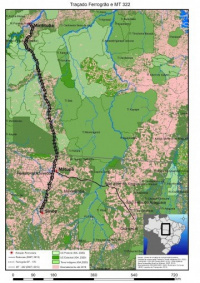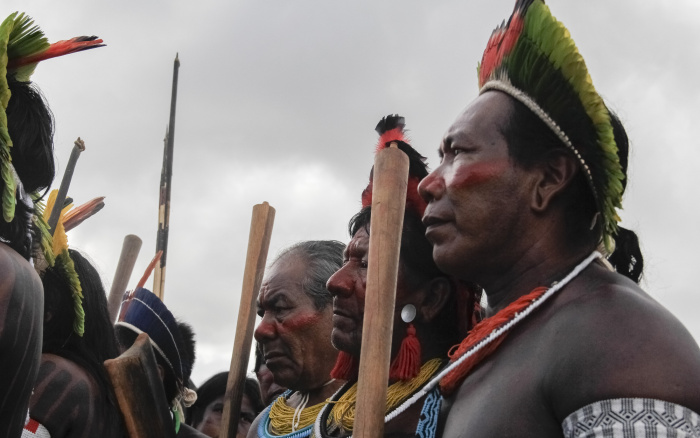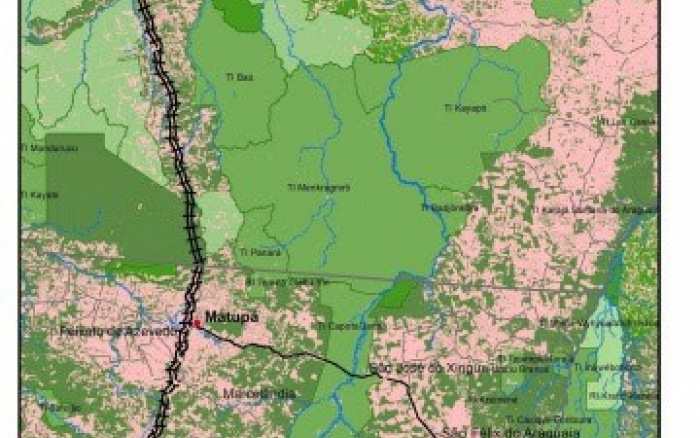Você está na versão anterior do website do ISA
Atenção
Essa é a versão antiga do site do ISA que ficou no ar até março de 2022. As informações institucionais aqui contidas podem estar desatualizadas. Acesse https://www.socioambiental.org para a versão atual.
Ferrogrão: right of indigenous peoples to consultation can be decided this Friday (12)
quinta-feira, 11 de Março de 2021 
Esta notícia está associada ao Programa:
Decision can influence the implementation of the right to Free, Prior and Informed Consultation of indigenous and tribal peoples in Brazil about projects that impact their livelihoods before they are implemented
The right to consultation of the indigenous peoples that will be impacted by the Ferrogrão railroad can be decided this Friday (12). The public prosecutor at the Federal Court of Auditors (TCU in Portuguese) will present their legal opinion about the need of prior consultation of indigenous peoples at the project planning phase, a decision that can influence the future implementation of the right to Free Prior Informed Consent of indigenous and tribal peoples in Brazil.
The opinion of prosecutor Júlio Marcelo de Oliveira will be decisive in laying the ground for the judgment in the Second Chamber of the TCU. Reporting judge Aroldo Cedraz will have the final word in the case[More on the Ferrogrão case in TCU].
The case originated from a petition filed by 14 Federal Public Prosecutors and five civil society organizations, among them the Kayapó organization Instituto Kabu, Rede Xingu+ and Instituto Socioambiental (ISA). The petition demands the suspension of the concession of the railroad to the private sector until proper consultation about the feasibility of the project is undertaken, still at planning phase. Last Friday (5/3) another petition was presented to the TCU signed by 20 federal prosecutors and the civil society network Rede Xingu+ reiterating the claim and documenting several ilegallities incurred during the process.
Recently, a delegation of Kayapó and Munduruku indigenous leaders travelled to the capital Brasilia to meet with politicians, prosecutors and judges at TCU, among them Júlio Marcelo de Oliveira and Aroldo Cedraz, asking that the concession procedure be returned to the federal terrestrial transport agency ANTT, until proper consultation is carried out. At the meeting, Oliveira sai that his legal opinion would “take into consideration what you [indigenous leaders] present me”, and that “you are helping me to get in contact with this issue so that I can deepen my knowledge and issue my opinion”. [Learn more]
Know more how the right to Consultation and Free, Prior to Informed Consent works
The Ferrogrão railroad
The projected railroad, almost one thousand kilometers long, connects Sinop, an agriculture powerhouse municipality in Mato Grosso state, to the port of Miritituba in Pará state, where grains are boarded on ships to be further exported. The railroad is the main infrastructure priority of the federal government and is expected to reduce freight costs for agricultural produce and inputs in the Amazon, thus increasing deforestation.

The official project recognizes only the indigenous territories of Praia do Índio and Praia do Mangue, in Itaituba, Pará, as impacted by the railroad. Up to now, the Munduruku people have not been consulted about the project in accordance with their Consultation Protocol. [Read the letter from Munduruku leaders about the lack of consultation during the Ferrogrão feasibility studies].
On December 2017, ANTT had committed to undertake the Prior Consultation process before the concession procedures were submitted to appreciation of the Federal Court of Auditors (TCU) (see meeting document). Despite the commitment, federal authorities eventually submitted the concession process to TCU on July 2020 without any consultation whatsoever to indigenous peoples.
Federal prosecutors that support the claims of the indigenous groups warn that if TCU does not take into account the participation of the indigenous peoples in the planning of the railroad, the social and environmental costs of the project may be gravely underestimated. According to independent parallel studies, up to 16 indigenous territories of the Munduruku, Panará and Kayapó peoples, as well as the iconic Xingu Indigenous Territory, can be affected by the railroad.
ISA
Imagens:





